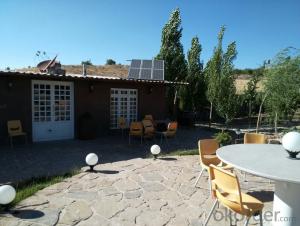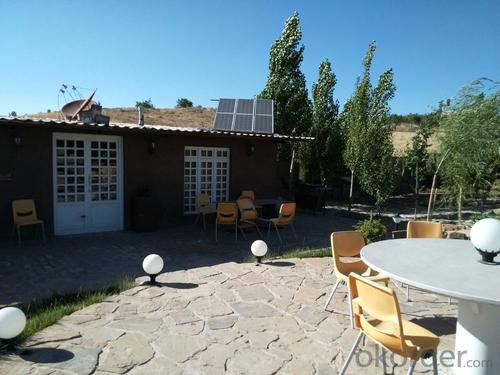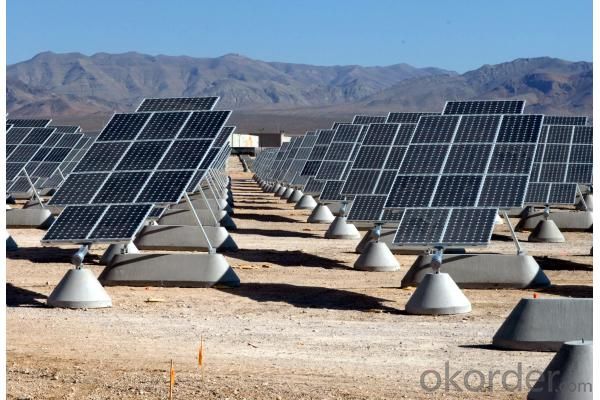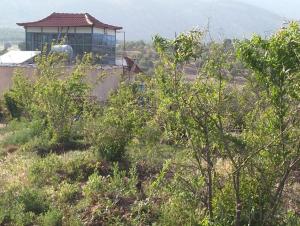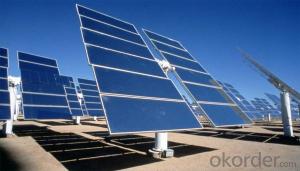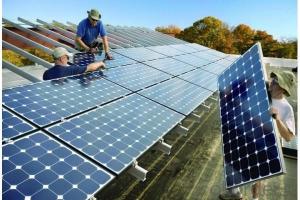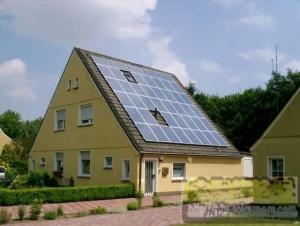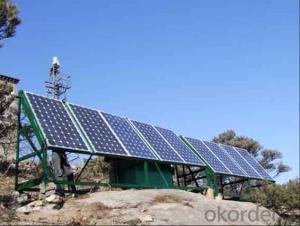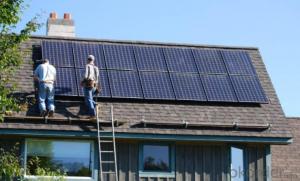La Union Solar Energy Systems - Off-Grid Solar Power System 4kw High Efficiency
- Loading Port:
- China main port
- Payment Terms:
- TT OR LC
- Min Order Qty:
- 1 pc
- Supply Capability:
- 10000 pc/month
OKorder Service Pledge
OKorder Financial Service
You Might Also Like
1.Description of Product
Off-Grid Solar Power System is consisted of solar panel, solar charge controller, inverter, battery, mounting rack and cables.
(1).Grid-connected, send power to city grid
(2).MPPT technology, wide range of working voltage
(3).Simply Wiring, easy installation, customized design for your projects
(4).Low investment & long term feedback
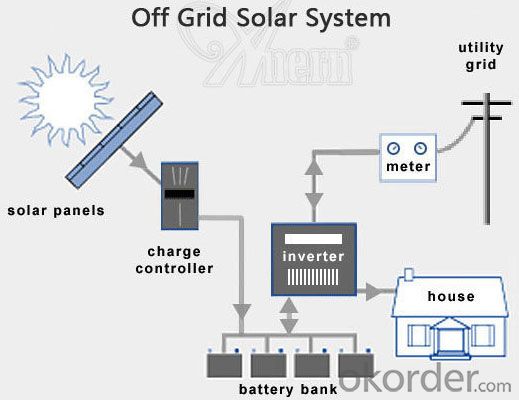
2. Off-Grid Features
1. Off grid solar power system is mainly used for application with relatively-small power consumption, and the areas have no grid network coverage, or grid power is unstable or outage condition.
2. It’s composed of solar panels, hybrid solar inverter, battery bank, solar panel mounting racks, and other accessories required fora complete home solar power system.
3. The battery bank gives a stable power output to the solar inverter which converts DC to AC to power loads, and provides power backup in rainy or cloudy days.
4. The solar panels generate electricity at daytime and charge the battery bank .
5. The off grid home solar power system provides grid power bypass in case of battery power shortage when sunshine is not enough.
6. All the off grid home solar power system configurations are worked out by scientific calculation and design.
Ref No. | 4KW |
Solar Panel | Type: Monocrystalline Silicon PV Module Max Power: 250W QTY:12 pcs |
Controller-Inverter Integrator | Rated Ouput Power: 4000W Rated DC Voltage: 48V QTY:1 pcs |
Battery | 12V/150AH per piece QTY:12 pcs |
Solar Panel Rack | Roof type mounting rack, anodized aluminum material, including complete fittings (Other type of racks can be customized as per client's requirement) QTY:1 pcs |
Cables | International standard, with specification suitable for solar system, BV1*10 QTY:80m |
3.The Pictures of Product
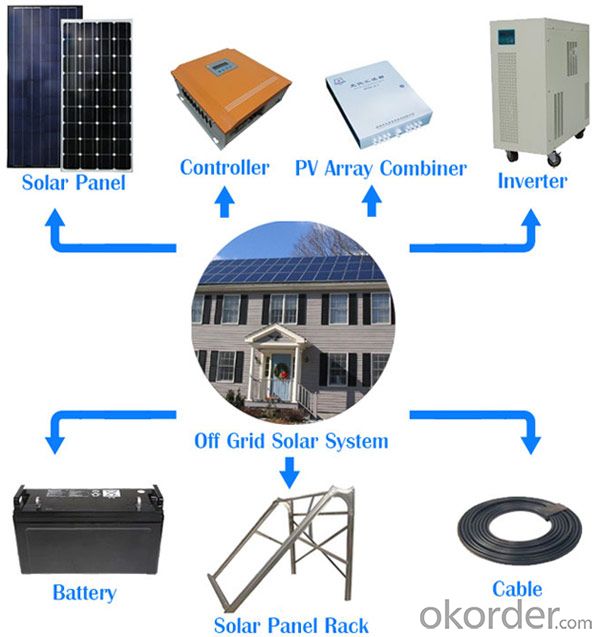
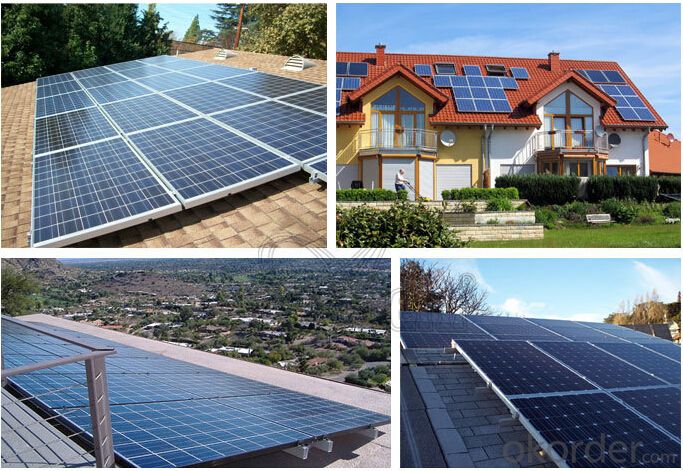
4.FAQ
Q1: What is the business type for the company?
A1: We are one of the biggest manufacturers inBejing.Chnia. Which is a high tech PV enterprise dedicated to the research, development, production and sales..
Q2: How long solar panel warranty can you offer?
A2: 10-Year product warranty,25-year linear power output warranty
If there is any quality problem, we will pay for freight and send free parts to you.
Q3: How many certificates do you have?
A3: We have 16 certificates,such as CE, TUV, UL, and so on.
Q4: Can I be the agent for you?
A4: Yes,We can discuss some information.
Q5: How to get a sample?How can cooperation with us
A5: contact us now.
- Q: What is the lifespan of solar energy inverters?
- Solar energy inverters can have varying lifespans due to factors such as the inverter's quality, usage, and maintenance. Generally, a solar energy inverter that is of high quality and properly maintained can last approximately 10 to 15 years. However, thanks to technological advancements and enhanced durability, certain inverters can endure for 20 years or even more. It is crucial to bear in mind that regular maintenance, including thorough cleaning and inspection, can assist in prolonging the inverter's lifespan. Furthermore, selecting a reputable brand and ensuring correct installation can also contribute to an extended lifespan for solar energy inverters.
- Q: How do solar energy systems impact utility bills?
- Solar energy systems can significantly reduce utility bills by generating electricity from the sun, thereby decreasing reliance on traditional energy sources. This cost-saving impact is achieved through the production of renewable energy, which reduces or eliminates the need to purchase electricity from the grid.
- Q: How does solar energy compare to other renewable energy sources?
- Solar energy is a highly efficient and versatile renewable energy source that has numerous advantages over other renewable energy sources. Firstly, solar energy is abundant and widely available, as it is derived from the sun, which is an inexhaustible source of energy. This makes solar energy more reliable and sustainable compared to other renewable sources like wind or hydroelectric power, which are dependent on specific weather conditions or geographical features. Additionally, solar energy is a decentralized energy source, meaning it can be generated and utilized at the point of consumption. This reduces the need for extensive transmission infrastructure, which is often required for other renewable energy sources like geothermal or tidal energy. Solar panels can be installed on rooftops or in open spaces, enabling individuals and businesses to generate their own electricity and reduce their dependence on the grid. In terms of environmental impact, solar energy is considered one of the cleanest energy sources available. Unlike fossil fuels, solar energy does not produce harmful emissions or contribute to air pollution. It also requires minimal water usage compared to other renewable sources like hydroelectric power, which can be particularly important in areas with water scarcity. By harnessing the power of the sun, solar energy helps combat climate change and reduces our reliance on finite resources. Furthermore, solar energy has become increasingly cost-effective in recent years, with the cost of solar panels and installations declining significantly. This has made solar energy more accessible to a wider range of individuals and businesses, leading to a rapid growth in the solar industry. In comparison, other renewable energy sources may still require more investment and have higher operational costs. While solar energy has many advantages, it is important to note that it also has some limitations. It is intermittent, meaning it is only available during daylight hours and can be affected by weather conditions. However, advancements in energy storage technologies, such as batteries, are addressing this limitation by allowing solar energy to be stored for use during non-sunlight hours. In conclusion, solar energy stands out among other renewable energy sources due to its abundance, reliability, decentralization, environmental benefits, and decreasing costs. As we strive to transition to a more sustainable energy future, solar energy plays a crucial role in meeting our energy needs while minimizing our impact on the environment.
- Q: Can solar energy systems be installed on the ground?
- Yes, solar energy systems can be installed on the ground. In fact, ground-mounted solar systems are a popular choice for both residential and commercial applications. These systems typically consist of solar panels mounted on a structure or framework that is anchored to the ground. Ground-mounted systems offer several advantages over rooftop installations, such as increased flexibility in system design, easier access for maintenance and cleaning, and the ability to optimize the orientation and tilt angle of the panels for maximum energy production. Additionally, ground-mounted systems can be installed in areas with limited roof space or where the roof is not suitable for solar panel installation. Overall, ground-mounted solar energy systems provide a practical and efficient way to harness the power of the sun for electricity generation.
- Q: Can solar energy systems be used for space cooling?
- Yes, solar energy systems can be used for space cooling. Solar-powered air conditioning systems use solar energy to generate electricity, which is then used to power the cooling process. These systems can be used to cool indoor spaces, reducing the reliance on conventional electricity sources and minimizing the environmental impact.
- Q: How do solar energy systems impact grid stability?
- Solar energy systems can have both positive and negative impacts on grid stability. On one hand, solar energy systems can help improve grid stability by reducing the overall demand for electricity during peak times. This is because solar energy production typically aligns with peak electricity demand, which helps balance the grid and reduces the need to rely on other power sources. On the other hand, the intermittent nature of solar power can pose challenges to grid stability. Sudden fluctuations in solar energy production due to weather conditions can create voltage and frequency variations, which can affect the stability of the grid. However, with proper integration and management techniques, such as energy storage systems and advanced grid control technologies, the negative impacts of solar energy systems on grid stability can be minimized.
- Q: Can solar energy systems be used in disaster-prone areas?
- Yes, solar energy systems can be used in disaster-prone areas. In fact, they can be particularly beneficial in such areas. Traditional power grids are often fragile and vulnerable to damage during natural disasters such as hurricanes, earthquakes, or floods. This can leave the affected areas without electricity for extended periods, hindering relief and recovery efforts. Solar energy systems, on the other hand, are decentralized and can operate independently of the grid. These systems consist of solar panels that convert sunlight into electricity, which can be stored in batteries for use during times of power outage. This allows critical facilities, such as hospitals, emergency response centers, and shelters, to continue functioning even when the grid is down. Solar energy systems can provide a reliable source of power for lighting, communication, refrigeration, and medical equipment, greatly enhancing the resilience and effectiveness of disaster response. Furthermore, solar energy systems can also be used to power water pumps, providing communities with access to clean water during times of crisis. This is particularly important in disaster-prone areas, where access to safe drinking water can be severely compromised. Solar-powered pumps can extract water from wells, rivers, or other sources, ensuring a constant supply for drinking, sanitation, and hygiene purposes. Additionally, solar energy systems can contribute to long-term recovery efforts in disaster-prone areas. By reducing dependence on fossil fuels and traditional power grids, they can help build more sustainable and resilient communities. Solar panels can be installed on rooftops or in open spaces, making use of abundant sunlight resources. This not only reduces greenhouse gas emissions and mitigates climate change but also provides a reliable and affordable source of energy for homes, businesses, and public infrastructure. In conclusion, solar energy systems can be effectively used in disaster-prone areas to provide reliable power, support critical services, and contribute to long-term resilience. By harnessing the power of the sun, these systems offer a sustainable and decentralized solution to energy needs, ensuring that communities can withstand and recover from natural disasters more effectively.
- Q: Can solar energy systems be used in areas with high levels of dust or debris?
- Yes, solar energy systems can be used in areas with high levels of dust or debris. However, regular maintenance and cleaning may be required to ensure optimal performance of the solar panels.
- Q: Are there any financial incentives for installing solar energy systems?
- Yes, there are several financial incentives available for installing solar energy systems. These incentives include federal tax credits, state and local rebates, grants, and loan programs. Additionally, installing solar panels can lead to long-term cost savings on electricity bills, as solar energy is renewable and reduces reliance on traditional energy sources.
- Q: Can solar energy systems be used in areas with limited access to the electrical grid?
- Yes, solar energy systems can definitely be used in areas with limited access to the electrical grid. In fact, solar power is an ideal solution for such areas as it offers a decentralized and sustainable source of electricity. Solar energy systems, such as photovoltaic panels, harness the energy from the sun and convert it into usable electricity. These systems can be installed in remote locations without the need for extensive electrical infrastructure. By utilizing solar energy systems, areas with limited access to the electrical grid can become self-sufficient in meeting their energy needs. These systems can power essential appliances, such as lighting, communication devices, and small-scale machinery, providing reliable energy even in areas where traditional grid connections are not available or unreliable. Moreover, solar energy systems can bring numerous benefits to areas with limited grid access. They offer an environmentally friendly alternative to traditional fossil fuel-dependent energy sources, thereby reducing carbon emissions and combating climate change. Solar power systems also provide a reliable and consistent source of energy, reducing the dependence on diesel generators or other costly and polluting forms of energy. Additionally, solar energy can promote economic growth and development in remote areas. By powering essential infrastructure like schools, hospitals, and businesses, solar systems can improve education, healthcare, and economic opportunities. Moreover, the installation and maintenance of solar energy systems can create local jobs and foster entrepreneurship. To ensure the successful implementation of solar energy systems in areas with limited grid access, it is crucial to address challenges such as initial costs, technical expertise, and maintenance. However, with advancements in technology and decreasing costs, solar power has become increasingly accessible and affordable. Various organizations, governments, and non-profit entities are actively working to promote solar energy adoption in such areas and provide necessary assistance. In conclusion, solar energy systems are a viable and sustainable solution for areas with limited access to the electrical grid. They offer a decentralized, reliable, and environmentally friendly source of electricity, bringing numerous benefits to these regions. By harnessing the power of the sun, these systems can empower communities, promote economic development, and improve the quality of life for those living in remote areas.
Send your message to us
La Union Solar Energy Systems - Off-Grid Solar Power System 4kw High Efficiency
- Loading Port:
- China main port
- Payment Terms:
- TT OR LC
- Min Order Qty:
- 1 pc
- Supply Capability:
- 10000 pc/month
OKorder Service Pledge
OKorder Financial Service
Similar products
Hot products
Hot Searches
Related keywords
